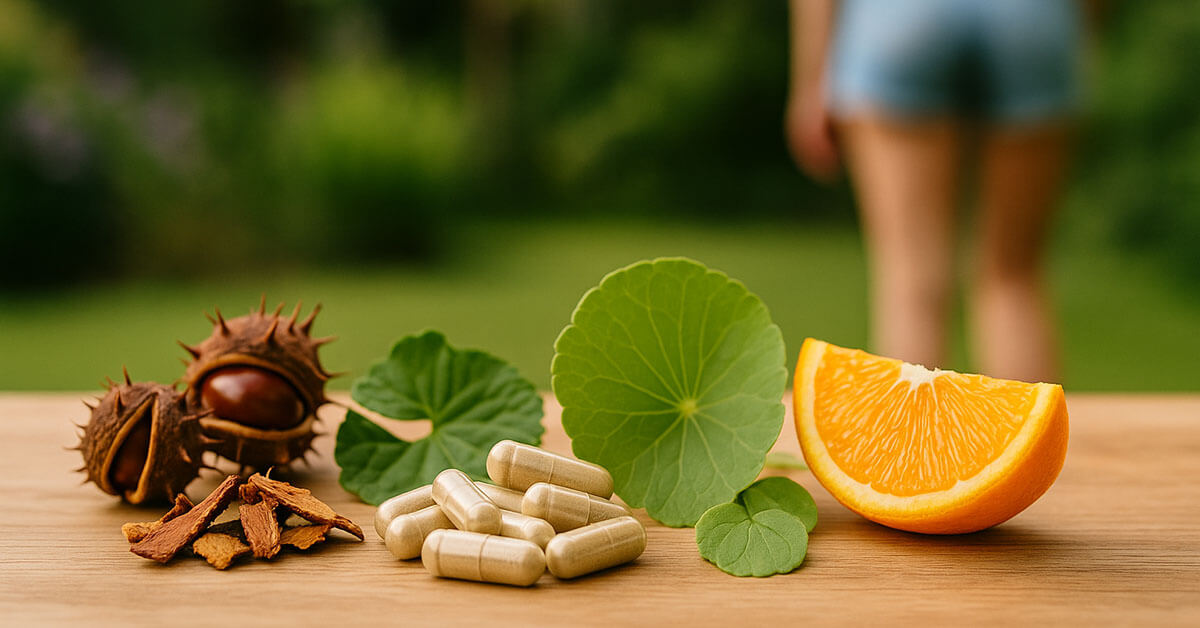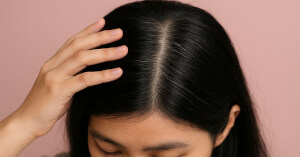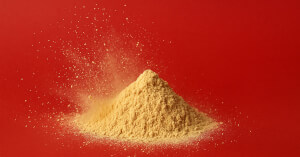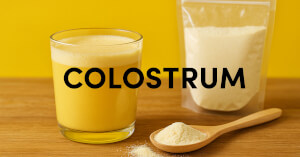
What Supplements Can Help with Varicose Veins?

Varicose veins are a common issue for millions of women around the globe. They typically show up as twisted, swollen veins on the legs and can cause discomfort like heaviness, swelling, and pain.
While strategies like wearing compression stockings, staying active, and managing your weight are essential, certain supplements can also help support vein health and boost circulation.
In this article, we’ll dive into the most researched and effective supplements for varicose veins, along with some lifestyle tips to help you manage your symptoms in a more natural way.
Horse Chestnut
Horse chestnut is widely recognized as one of the top natural remedies for chronic venous insufficiency, which is the root cause of varicose veins. The key ingredient, aescin, plays a vital role in enhancing circulation and strengthening vein tone.
Studies have shown that horse chestnut can reduce swelling, pain, and the feeling of heaviness in the legs. Many people report improved comfort after a few weeks of consistent use.
- Improves vein tone and elasticity
- Helps reduce swelling and discomfort
- Supports microcirculation in the lower limbs
Diosmin and Hesperidin (Citrus Bioflavonoids)
Diosmin and hesperidin are flavonoids extracted from citrus fruits. They are widely prescribed in Europe as natural vein protectors and are often combined in supplement form.
These compounds strengthen the walls of blood vessels and improve lymphatic drainage. They may also reduce leg cramps, swelling, and the sensation of restless legs at night.
- Strengthen blood vessel walls
- Reduce inflammation and oxidative stress
- Improve lymphatic flow and circulation
Butcher’s Broom
Butcher’s broom has been used for centuries as a herbal remedy for circulation problems. Modern research shows it can tighten blood vessels and reduce pooling of blood in the legs.
It is especially helpful when combined with hesperidin or other flavonoids, as the synergy may enhance vein health benefits.
- Supports healthy vein tone
- Helps decrease swelling in the legs
- May reduce the sensation of heaviness
Gotu Kola (Centella asiatica)
Gotu kola, also known as Centella Asiatica, is a traditional herb that has gained attention in modern medicine for its ability to improve circulation and strengthen capillaries. Its extracts are commonly used in Europe for chronic venous insufficiency and are also getting a lot of interest in skin care.
Research indicates that Gotu Kola may reduce swelling and discomfort while improving microcirculation. It can be particularly effective in people who experience tingling or restless sensations in the legs.
- Strengthens vein walls and connective tissue
- Improves microcirculation and blood flow
- Reduces swelling and heaviness in the legs
Other Supportive Nutrients
Pine Bark Extract
Pine Bark Extract is a powerful antioxidant that supports circulation and reduces swelling. Several studies show that it may improve leg comfort and lower edema in people with vein disorders.
Vitamin C
Vitamin C plays an essential role in collagen production, which helps keep vein walls strong and flexible. A deficiency can weaken blood vessels and contribute to varicose vein formation.
Omega-3 Fatty Acids
Omega-3s support healthy circulation and reduce inflammation. They may also help prevent blood from becoming too thick, which can ease blood flow in the veins.
On a side note, getting your Omega-3s from algae is a smart choice. It can be slightly more expensive, but algae oil can have the same levels of DHA and EPA than standard fish oil, while also being more sustainable and carrying fewer contaminants.
Lifestyle Tips to Maximize Results
Supplements work best when combined with simple lifestyle adjustments. Movement and circulation are key to keeping varicose veins under control.
- Walk or cycle regularly to improve blood flow
- Elevate your legs when resting to reduce swelling
- Maintain a healthy body weight to avoid pressure on the veins
- Avoid sitting or standing still for long periods without movement
Bottom Line
Varicose veins can be uncomfortable and affect daily life, but natural support exists. Horse chestnut, citrus bioflavonoids, butcher’s broom, and gotu kola are among the most researched supplements for improving circulation and vein health.
Adding supportive nutrients like vitamin C, omega-3s, and pycnogenol, alongside lifestyle strategies, may further enhance results. As always, speak with a healthcare professional before starting new supplements, especially if you are pregnant, breastfeeding, or taking blood-thinning medication.
FAQs About Supplements for Varicose Veins
Can supplements cure varicose veins?
Supplements cannot cure varicose veins, but some may reduce heaviness, swelling, and discomfort by supporting vein tone and microcirculation. They work best alongside lifestyle steps like walking, leg elevation, and compression stockings.
What are the best supplements for varicose veins?
Horse chestnut extract, diosmin with hesperidin, butcher’s broom, gotu kola, and pycnogenol are among the most used options for venous support. Vitamin C and omega-3s can be supportive as part of a broader plan.
How long do supplements take to work for varicose veins?
Many people notice lighter legs and less swelling after 2 to 4 weeks of consistent use. For full assessment, give a supplement 6 to 8 weeks while keeping up daily movement and leg elevation.
Are these supplements safe during pregnancy or breastfeeding?
Pregnancy and breastfeeding require medical guidance. Do not start horse chestnut, diosmin, butcher’s broom, gotu kola, or pycnogenol without speaking to your healthcare professional first.
Can I take these with blood thinners or if I have a clotting disorder?
If you use anticoagulants or have a bleeding or clotting disorder, consult your clinician before starting any vein supplement. Some ingredients may interact with blood thinners or affect platelet function.
Typical dosages for vein support
Common protocols include: Horse chestnut seed extract standardized for aescin 100–150 mg aescin daily in divided doses. Diosmin with hesperidin 450–600 mg diosmin plus 50–100 mg hesperidin daily. Pycnogenol 100–150 mg daily. Gotu kola extract 60–120 mg of standardized extract daily. Always start low, assess tolerance, and follow product labels.
Do supplements replace compression stockings?
No. Compression remains a cornerstone of care for venous insufficiency. Supplements may complement compression by supporting vein tone and comfort but should not replace medical recommendations.
Common side effects to watch for
Most people tolerate these supplements well. Possible effects include stomach upset or headaches. Rarely, allergic reactions can occur. Stop use and seek medical advice if you notice concerning symptoms.
Who should not take vein supplements?
Avoid or seek medical advice if you are pregnant or breastfeeding, have liver or kidney disease, take anticoagulants or antiplatelet drugs, or have scheduled surgery. Personalized guidance is important.
What lifestyle changes boost results?
Walk daily, avoid long periods of sitting or standing, elevate legs when resting, maintain a healthy weight, and consider graduated compression stockings. These steps improve circulation and support supplement benefits.
This article was originally published on Stackbb, your trusted source for science-based supplement guides.







